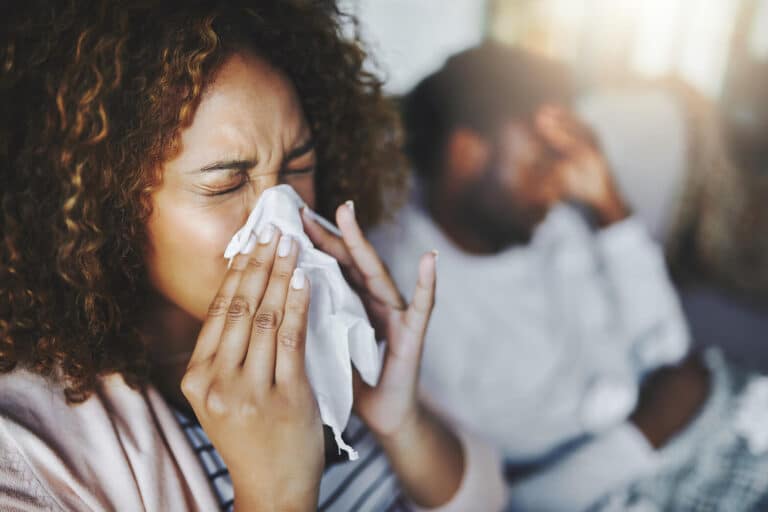Updated: 12 September 2022
A healthy digestive system has a significant impact on how your body functions, as well as your daily wellbeing. From generating energy and absorbing nutrients to influencing your mood, a healthy digestive system is essential. Here are a few tips to help you lead your healthiest life.
What Is the Digestive System?
Your digestive system comprises all the organs responsible for breaking down food to absorb nutrients and expel waste. These organs include the digestive tract, liver, pancreas, and gallbladder, the former of which consists of a long tube that spans from the mouth to the pharynx, esophagus, stomach, and small intestine to the colon.
Your digestive system is important because it turns your food into the nutrients needed to function and survive. Your body uses these nutrients for energy, growth, and cell repair.
Due to a strong link between your digestive system and the brain, research has shown that a healthy digestive system can affect your mood and overall mental health.
What are Signs of Digestive Problems?
Anyone can experience digestive issues, and common symptoms include bloating, cramps, gas, and constipation or diarrhea. Although these symptoms aren’t indicative of more severe problems, you might be at higher risk of these if you have existing conditions like irritable bowel syndrome (IBS), Chron’s Disease, and diverticulitis.
Common Digestive Health Problems
Gastroesophageal Reflux Disease (GERD)
No one likes acid reflux, aka heartburn. This happens when stomach acid backs up into your esophagus – usually occurring after meals or at night. While it’s common to experience acid reflux and heartburn every once in a while, if your symptoms affect your daily life or occur at least twice each week, it could be a sign of GERD.
According to the National Institute of Diabetes and Digestive and Kidney Diseases (NIDDK), GERD is a chronic digestive disease that affects 20% of Americans.
If you experience any of these symptoms, you need to see your doctor:
- persistent heartburn
- bad breath
- tooth erosion
- nausea
- pain in the chest or upper part of the abdomen
- trouble swallowing or breathing
Many people find relief by avoiding the foods and drinks that trigger their symptoms, and/or by taking over-the-counter antacids or other medicine that reduces stomach acid production and esophagus inflammation.
Other lifestyle changes like elevating your head, not lying down after a meal, avoiding tight-fitting clothing, and quitting smoking can help too. Some cases of GERD require stronger treatment like medication or surgery.
Gallstones
Another common digestive problem is gallstones – these are hard deposits that form in your gallbladder. Your gallbladder is a small, pear-shaped sac that stores and secrets bile for digestion. The American Gastroenterological Association states almost 1 million Americans suffer from gallstones annually.
These form when there’s too much cholesterol or waste in your bile, or if your gallbladder doesn’t empty properly. When gallstones block the ducts leading from your gallbladder to your intestines, they may cause sharp pain in your upper-right abdomen. Medication sometimes dissolves gallstones, but if that doesn’t work, the next step is surgery to remove the gallbladder.
Celiac Disease
Celiac disease is a serious sensitivity to gluten, which is a protein found in wheat, rye, and barley. So if you eat gluten ,your immune system goes into attack mode and damages the villi – fingerlike protrusions in your small intestines that help you absorb nutrients from the foods you eat.
According to Beyond Celiac – formerly the National Foundation for Celiac Awareness – an estimated 1 in 133 Americans (1% of the population) have celiac disease. It’s also estimated that over 80% of people with celiac disease don’t even know they have it – or have been misdiagnosed with a different condition.
In children, symptoms may include:
- abdominal pain and bloating
- diarrhea
- constipation
- vomiting
- weight loss
And in adults, symptoms can also include:
- anemia
- fatigue
- bone loss
- depression
- seizures
However, some people might not have any symptoms.
The only treatment for celiac disease is to completely avoid eating gluten. Common alternatives to gluten include brown rice, quinoa, lentils, soy flour, corn flour, and amaranth.

Crohn’s Disease
Crohn’s disease is part of a group of digestive conditions called inflammatory bowel disease (IBD). It can affect any part of the gastrointestinal tract but commonly affects the terminal ileum, which connects the end of the small bowel and the beginning of the colon. The Crohn’s & Colitis Foundation (CCFA), reports that nearly 800,000 American may be affected by this disease.
Doctors aren’t sure what causes the disease, but it’s thought that genetics and family history may play a part.
The most common Crohn’s symptoms are:
- abdominal pain
- diarrhea
- rectal bleeding
- weight loss
- fever
The treatment for Crohn’s disease depends on the symptoms and can include topical pain relievers, immunosuppressants, and surgery. Flares can be prevented by avoiding trigger foods like dairy products, carbonated beverages, alcohol, coffee, raw fruit and vegetables, red meat, and foods that are fatty, fried, spicy, or gas-producing.
Ulcerative Colitis
Another inflammatory bowel disease, ulcerative colitis, is estimated to affect nearly 1 million Americans, according to the CCFA. The symptoms of ulcerative colitis are similar to Crohn’s – primarily affecting the large intestine or colon.
If your immune system mistakes food or other materials for invaders, sores or ulcers develop in the colon’s lining. If you experience any of these symptoms, see your doctor:
- frequent and urgent bowel movements
- pain with diarrhea
- blood in your stool
- abdominal cramps
Medication can help calm the inflammation and avoiding foods that cause discomfort may help too. But in severe cases, treatment may involve surgery to remove the colon.
Irritable Bowel Syndrome
You could be suffering from irritable bowel syndrome (IBS), another common digestive condition if you have an irritable digestive tract or experience stomach pain or discomfort at least three times a month for several months.
According to the International Foundation for Functional Gastrointestinal Disorders, approximately 10-15% of people across the globe suffer from IBS.
Signs of IBS vary widely but may include:
- hard, dry stools
- watery stools
- bloating
The causes of IBS aren’t known, but treatment focuses mainly on diet changes like eating low-fat, high-fiber meals, as well as avoiding common trigger foods (dairy products, alcohol, caffeine, artificial sweeteners, and foods that produce gas). The low-FODMAP diet is a common go-to for reducing IBS symptoms – it involves eliminating foods that are high in certain carbohydrates called FODMAPs (fermentable oligosaccharides, disaccharides, monosaccharides, and polyols).
Friendly bacteria like probiotics found in live yogurt can also help you feel better. Stress can trigger IBS symptoms, so some people find cognitive behavioral therapy or low-dose antidepressants to be useful treatments as well.
Hemorrhoids
If you spot bright red blood in the toilet bowl when you move your bowels, it could be a sign of hemorrhoids – a very common digestive condition. According to NIDDK, 75% of Americans over age 45 have hemorrhoids.
Hemorrhoids are an inflammation of the blood vessels at the end of your digestive tract that can be painful and itchy. Causes include chronic constipation, diarrhea, straining bowel movements, and a lack of fiber in your diet.
Hemorrhoids will go away on their own by eating more fiber, drinking more water, and exercising. Over-the-counter creams and suppositories may provide temporary relief. Sometimes a hemorrhoidectomy is needed to remove hemorrhoids surgically.
Diverticulitis
Small pouches called diverticula can form anywhere there are weak spots in the lining of the digestive system – but they are commonly found in the colon. When someone has diverticula but experiences no symptoms, the condition is called diverticulosis – a common condition among older adults which rarely causes problems.
By age 50, around half of people have diverticulosis, according to the American Gastroenterological Association, but in around 5% of people, the pouches become inflamed or infected, this is called diverticulitis.
Symptoms include:
- fever
- chills
- nausea
- abdominal pain
A major risk factor for diverticulitis is obesity.
Mild cases are usually treated with antibiotics and a clear liquid diet to allow your colon to heal. Since a low-fiber diet could be the cause of diverticulitis, a doctor may tell you to eat a diet high in fiber – like whole grains, legumes, and vegetables.
If you have severe attacks that recur frequently, you might need surgery to remove the diseased part of your colon.

Anal Fissure
Anal fissures are tiny, oval-shaped tears in the lining toward the very end of your digestive tract, otherwise known as the anus. Symptoms of anal fissures are similar to hemorrhoids – like bleeding and pain after moving your bowels.
Straining and hard bowel movements can cause fissures – but the same can be said of soft stools and diarrhea.
The best treatment is usually a high-fiber diet that makes your stool well-formed and bulky. In addition to meds that relax anal sphincter muscles, or topical anesthetics and sitz baths to relieve pain. In chronic cases, surgery may be required.
9 Tips to Keep Your Digestive System Healthy
1. Eat Real Food
It’s not as simple as just eating healthy. When it comes to digestive health, eating real food plays a significant role. Typical Western diets, which are high in saturated fats, additives, and refined carbs, have been linked to an increased risk of developing digestive disorders. Luckily, findings suggest that diets high in nutrients protect against digestive diseases. So, limiting your intake of processed foods and eating a balanced diet based on whole foods may be best for keeping your digestive system happy and healthy.
2. Get Plenty of Fiber
Eating plenty of vegetables, fruits, and both insoluble and soluble fiber is key to a healthy gut. Insoluble fiber, found in foods like vegetables and whole grains like wheat bran, keeps everything moving through your digestive tract. While soluble fiber, found in foods like oat bran, barley, nuts, seeds, and beans, help your digestive system absorb water. A high-fiber diet has been related to a reduced risk of digestive conditions like acid reflux, hemorrhoids, ulcers, and IBS.
3. Stay Hydrated
Hydration is crucial to a healthy digestive system, and drinking plenty of water helps your gut function optimally. Research shows that low fluid intake is a common cause of constipation, and experts recommend drinking 1.5 – 2 liters of non-caffeinated fluids every day to prevent constipation. The typical daily recommendation is 2.7 liters of water for women and 3.7 liters of water for men, but you can also meet your fluid intake with herbal teas and other non-caffeinated beverages such as sparkling water.
4. Incorporate Gut-Supporting Nutrients
Another way to help your digestive system stay healthy is by ensuring you get enough gut-supporting nutrients. Probiotics, glutamine, and zinc are all gut-supporting nutrients you can incorporate for digestive help.
Probiotics are beneficial bacteria that assist in digestion by breaking down indigestible fibers, and studies show that they may alleviate symptoms of bloating, gas and IBS pain. Probiotics are found in fermented foods like sauerkraut, kimchi, and miso and yogurts that have live and active cultures.
Glutamine is an amino acid that supports digestive system health, and you can increase your glutamine levels by eating foods like turkey, soybeans, eggs, and almonds.
Zinc is another mineral that is essential to a healthy digestive system, and a deficiency may lead to various gastrointestinal disorders. Supplementing your zinc has been shown to help treat diarrhea, colitis, and other digestive issues. Foods high in zinc include shellfish, beef, and sunflower seeds.
5. Get Moving
Getting regular exercise is one of the best ways to improve your digestion health. Since exercise increases blood flow and boosts metabolism for smooth digestion. Exercise and gravity help food travel through your digestion system, which is why taking a walk after a meal may assist your body in moving things along. In fact, one study in healthy people revealed that moderate exercise, like jogging and cycling, increased gut function by nearly 30%. While another study of people who suffer from chronic constipation, a daily exercise routine significantly improved symptoms.

6. Manage Your Stress
If there’s one thing that can wreak havoc on your digestive system, it’s stress. It’s been associated with stomach ulcers, diarrhea, constipation, and IBS. Stress hormones directly affect your digestion. When your body is in fight-or-flight mode, your body thinks it doesn’t have time to rest and digest. When you are stressed out, blood and energy are diverted from your digestive system. In addition, your belly and brain are intricately connected, whatever affects your brain may also impact your digestion. Meditation, stress management, and relaxation training have all been shown to improve symptoms in people with IBS. And other studies revealed that cognitive-behavioral therapy, acupuncture, and yoga have improved digestive symptoms. So incorporating stress management techniques, such as deep belly breathing, meditation, or yoga, may improve not only your mindset but also your digestion.
7. Be Mindful
Practicing mindfulness is also useful when you incorporate it into your eating habits. It’s easy to eat too much too quickly if you’re not paying attention, which can lead to gas, bloating, and indigestion. That’s where the mindfulness bit comes in. Mindful eating is the practice of paying attention to all aspects of your food and the entire process of eating, and studies have shown that mindfulness may help reduce symptoms in people with ulcerative colitis and IBS.
To Eat Mindfully:
- Eat slowly.
- Focus on the ritual of eating – remove any distractions, such as TV or phones.
- Notice how your food looks on your plate, how it smells, how it tastes.
- Chew each bite consciously.
- Take in the texture, temperature, and taste of what you are eating.
Digestion begins in your mouth. Your teeth break down the food into smaller pieces so that the enzymes in your digestive tract are better able to break it down. Poor chewing is linked to decreased nutrient absorption. When you chew your food properly, your stomach has less work to do. And chewing produces saliva; the longer you chew, the more saliva is made – which kickstarts the digestive process in your mouth by breaking down some of the fats and carbs in your food. Saliva acts as a fluid in your stomach, which mixes with the solid food to pass smoothly into your intestines. Chewing your food enough ensures you have plenty of saliva for digestion and may help prevent symptoms like indigestion and heartburn.
8. Slow Down And Listen To Your Body
It’s easy to overeat and experience gas, bloating, and indigestion when you’re not paying attention to your hunger and fullness cues. It takes about 20 minutes for your brain to realize that your stomach is full. There might not be hard science to back this up, but we do know that it takes time for hormones released by your stomach in response to food to reach your brain. So taking the time to eat slower and pay attention to how full you’re getting is one way to prevent common digestive issues.
9. Ditch Bad Habits
Bad habits like smoking, drinking excessive amounts of alcohol, and eating late at night aren’t great for overall health, and they may be responsible for some common digestive issues.
Smoking, for one, nearly doubles your risk of developing acid reflux and has been associated with stomach ulcers, increased surgeries in people with ulcerative colitis, and gastrointestinal cancers.
And alcohol can increase acid production in your stomach and may lead to heartburn, acid reflux, and stomach ulcers. It has also been linked to inflammatory bowel diseases.
Late-night eating is another bad habit that isn’t helpful to a healthy digestive system. Eating late at night and then lying down to sleep can lead to heartburn and indigestion; your body needs time to digest, and gravity helps keep the food you eat moving in the right direction. If you do experience digestive issues at bedtime, try waiting three to four hours after eating before you go to bed to allow the food time to begin digesting.
These tips should help you maintain a healthy digestive system. But, if you experience digestive problems regularly, you might need medical help. It’s important to speak with a doctor who can help you track your digestive health and manage your symptoms. Book a consultation with a medical professional through the Air Doctor app and get the help you need to enjoy a healthy and happy digestive system.











